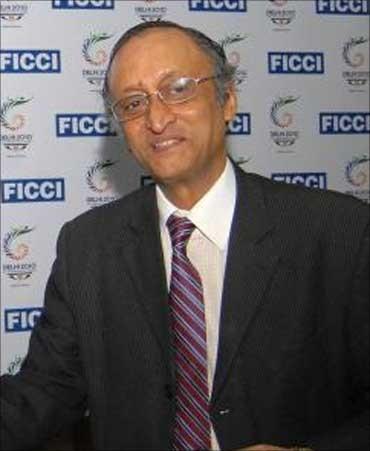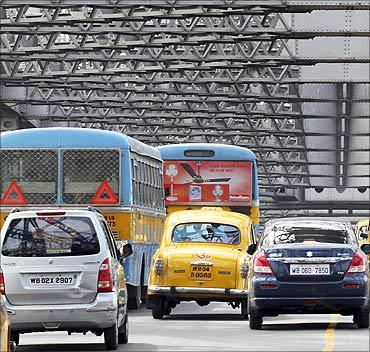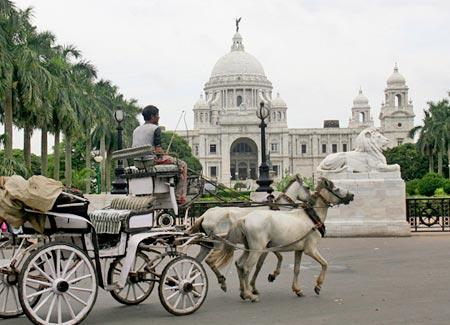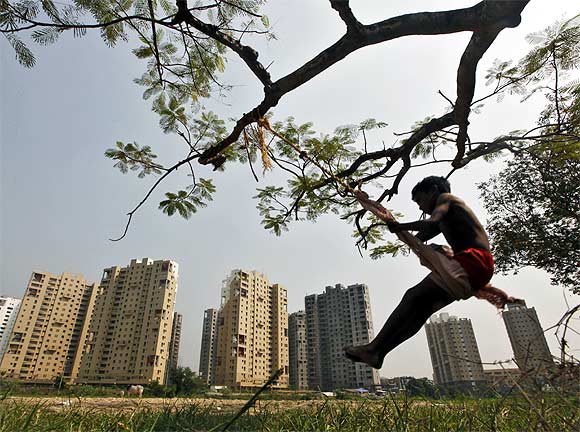 | « Back to article | Print this article |
Industry positive on Mamata govt; worried over fiscal issues
On completion of the first year of the new government in West Bengal under Chief Ministership of Mamata Banerjee, industry leaders have said it has made some positive moves that will help business but raised concerns over the state's fiscal situation.
Chairman of the Ambuja Realty Group Harsh Neotia said, "The government has shown urgency and energy to push for peace in Junglemahal and Darjeeling. This will create a positive climate for development."
He also said it was positive that the new government has made certain laws to hold land in excess of ceiling limit for approved industrial projects.
Click NEXT to read further. . .
Industry positive on Mamata govt; worried over fiscal issues
West Bengal Industry Minister Partha Chatterjee has said that by amending section 14Y of the Land Reform Act by which enterprenuers could acquire and hold land beyond 24 acre for industrial purpose, the combined potential investment could be anywhere between Rs 90,000 crore (Rs 900 billion) and Rs 1,10,000 crore (Rs 1,100 billion) by 128 companies.
JSW alone is planning to invest Rs 20,000 crore (Rs 200 billion) in the first phase for a three-million tonne steel plant of a proposed 10 million integrated steel project in phases at Salboni in West Midnapore district.
"We cannot expect a miracle in one year. But it has resolved the 14Y issue which was hanging fire for long," Shyam Steel director Lalit Beriwala said.
Click NEXT to read further. . .
Industry positive on Mamata govt; worried over fiscal issues
Chairman of the RP-Sanjiv Goenka Group Sanjiv Goenka said, "It is a good year. We are committed to invest in the state."
Asked whether the state government's land policy would be a hindrance for investment, he told PTI from the US, "You cannot see one specific thing that way. You have to see the whole package. I will invest in West Bengal."
Confederation of Indian Industry member and president of Bengal Chamber of Commerce Harsh Jha, however, said that the perception of state had not changed with the change in government.
"It has failed to change the perception about West Bengal being not a safe or easy place to do business," Jha said in a statement to PTI.
Click NEXT to read further. . .
Industry positive on Mamata govt; worried over fiscal issues
Jha said the manner of fiscal management explicitly stated or implicitly understood, raised serious concerns about the ability of the state government to manage its finances.
He added, however, one positive is that the government was able to send across the message that disruption in economic activity and daily life of people on account of undesirable bandhs would not be allowed.
"The message was loud and clear to all, including government servants and that frequent bandhs of the past are not conducive to development and growth," Jha said.
"The government performed well in ensuring that widespread belief of the people that the change may lead to violence, was proved wrong.
"It ensured fairly orderly and smooth transfer of power," he observed.
Click NEXT to read further. . .
Industry positive on Mamata govt; worried over fiscal issues
There were concerns among industrialists about direct land acquisition after the present government stated it would not acquire land anymore for industry.
"In principle I believe in the policy of industry buying land directly.
"However, given the realities of land ownership patterns in India, some government mechanism may perhaps be required at least for cases where 90 per cent or so of the land has already been procured would greatly reassure potential investors," TIL vice-chairman and managing director Sumit Mazumdar said.
Vice-president of Assocham Sunil Kanoria said, "Several positive initiatives have been taken by the state government in their first 12 months in office."
Click NEXT to read further. . .
Industry positive on Mamata govt; worried over fiscal issues
Most prominent among them has been the initiation of a constructive dialogue process with separatist forces, be it in the hill region or in the Maoist-infested areas, Kanoria said.
"To pacify the discontent of the separatist forces, a result of decades of negligence and deprivation from the benefits of economic development, the state government must
focus on promoting faster industrial and infrastructure development that create a large number of jobs, especially for the vast number of semi-skilled and unskilled labour force," he said.
"However, having inherited a huge debt burden, this government cannot fund all projects on its own and thus needs private sector to be a partner in the growth process," Kanoria said.
Click NEXT to read further. . .
Industry positive on Mamata govt; worried over fiscal issues
"Though the government has initiated a process of dialogue with the business community towards this end, there are concerns regarding decision-making getting stuck at various levels of the government," he said.
Kanoria said, "the state government needs to address these issues so that decision making can be accelerated and the state is able to attract more private investment into big infrastructure projects and in creating new industries."
Another achievement by the government was handover of the 1600 MW Katwa thermal power project of the West Bengal Power Development Corporation to NTPC with the government declining to acquire land.
Click NEXT to read further. . .
Industry positive on Mamata govt; worried over fiscal issues
The erstwhile Left Front government had succeeded in acquiring only 550 acre of the 1050 acre required.
The RP-Sanjiv Goenka group owned CESC Ltd has put the onus of reviving the decade-old Balagarh thermal power project on the state government.
The CESC board has cleared the 1,920 MW project for estimated investment of Rs 10,500 crore (Rs 105 billion), but with a rider that the government provide the company with a captive coal block or a linkage.







